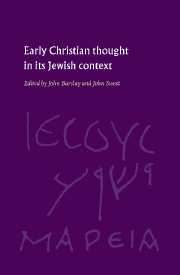Book contents
- Frontmatter
- Contents
- List of contributors
- Preface
- List of works by Morna D. Hooker
- List of abbreviations
- Chapter 1 Introductory Essay
- I THE SOCIAL CONTEXT OF EARLY CHRISTIANITY
- II SOME EARLY CHRISTIAN SOURCES
- III SOME EARLY CHRISTIAN THEMES
- Chapter 14 ‘In accordance with the Scriptures’
- Chapter 15 Land, sanctuary and worship
- Chapter 16 Monotheism and christology
- Chapter 17 Apocalyptic, God and the world.
- Chapter 18 Atonement and martyrdom
- Chapter 19 Halakhah and ethics in the Jesus tradition
- Index of names
- Index of subjects
- Index of texts
Chapter 14 - ‘In accordance with the Scriptures’
from III - SOME EARLY CHRISTIAN THEMES
Published online by Cambridge University Press: 22 September 2009
- Frontmatter
- Contents
- List of contributors
- Preface
- List of works by Morna D. Hooker
- List of abbreviations
- Chapter 1 Introductory Essay
- I THE SOCIAL CONTEXT OF EARLY CHRISTIANITY
- II SOME EARLY CHRISTIAN SOURCES
- III SOME EARLY CHRISTIAN THEMES
- Chapter 14 ‘In accordance with the Scriptures’
- Chapter 15 Land, sanctuary and worship
- Chapter 16 Monotheism and christology
- Chapter 17 Apocalyptic, God and the world.
- Chapter 18 Atonement and martyrdom
- Chapter 19 Halakhah and ethics in the Jesus tradition
- Index of names
- Index of subjects
- Index of texts
Summary
INTRODUCTION
The outlook, content, and language of the New Testament (NT) are largely determined by the Old Testament Scriptures (OT). It is therefore pertinent to ask in what ways these Scriptures are utilized in the NT. The topic is so vast, however, that only a few aspects can be included in this essay.
The overall picture is that the Scriptures are used in various forms of expression, such as explicit quotations, allusions, and retelling of stories. Many of the explicit quotations are introduced by a formula phrase, such as ‘as it is written …’. Romans 1.17 may serve as an example: …‘ as it is written, “He who through faith is righteous shall live” [Hab. 2.4]’. Corresponding formulae occur in Jewish writings. In the Gospels of Matthew and John some of the introductory formulae state that a scriptural passage has been fulfilled, such as for example in Matt. 2.15: ‘This was to fulfil what the Lord had spoken by the prophet, “Out of Egypt have I called my son” [Hos 11.1]’.A similar understanding of the Scriptures existed in the Qumran community (Stendahl 1954, p. 35). They thought that the present was the eschatological time and saw the history of their community to be the fulfilment of prophecy.
Information
- Type
- Chapter
- Information
- Early Christian Thought in its Jewish Context , pp. 193 - 206Publisher: Cambridge University PressPrint publication year: 1996
